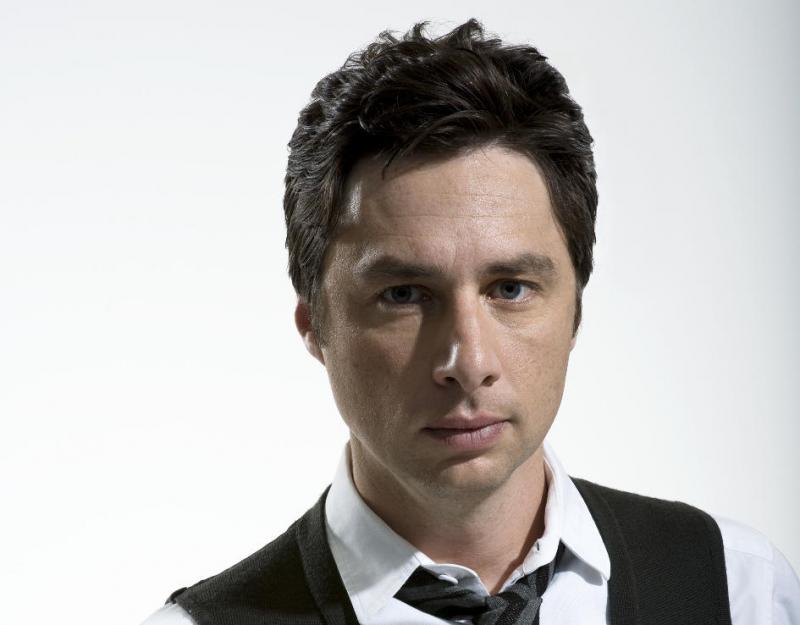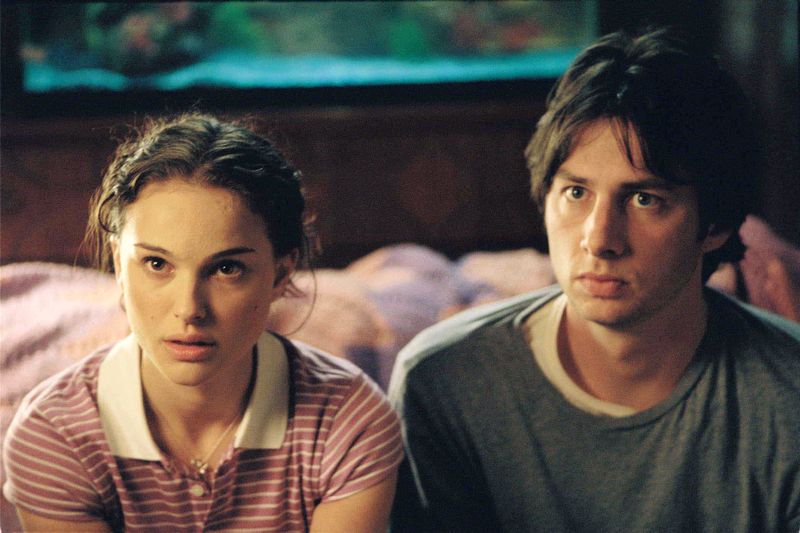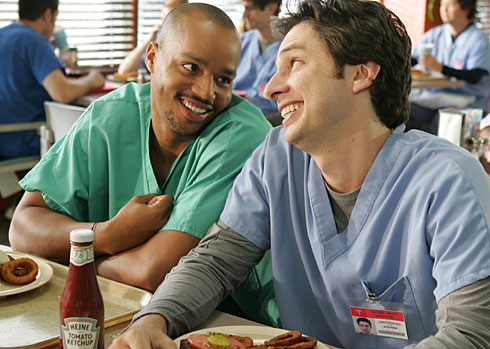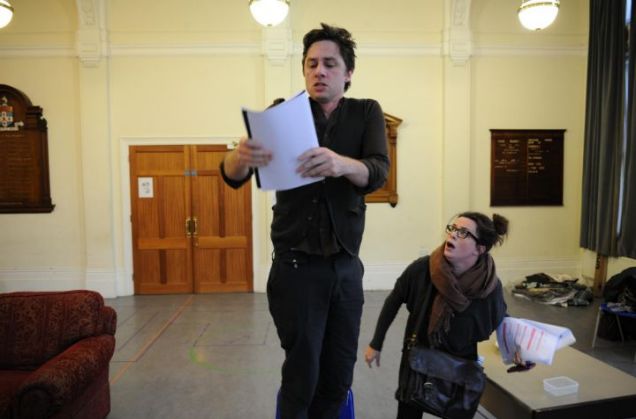theartsdesk Q&A: Actor Zach Braff | reviews, news & interviews
theartsdesk Q&A: Actor Zach Braff
theartsdesk Q&A: Actor Zach Braff
The star of Scrubs and writer-director of Garden State brings his debut play to the West End

Zach Braff (b 1975) is overwhelmingly known as the star of Scrubs, the hugely popular American hospital comedy which came with a side order of surrealism. But fans of low-budget indie cinema will also cherish fond memories of Garden State, which he wrote, directed and starred in alongside Natalie Portman.
After that promising debut, Braff retreated into silence. Pinioned for nine seasons in a contract which made him available for other work for only four months of the year, it was only when Scrubs came to an end that he was free to pursue other avenues, the first of which was a play. Set on Long Beach Island, All New People opens on a man (played by Braff) attempting to hang himself on the occasion of his 35th birthday, only to be dissuaded by a young female English letting agent with visa problems, an over-educated fireman and an extremely expensive escort. Last summer it opened off Broadway. It now arrives in the West End with, apart from its creator and star, a British cast. Zach Braff talks to theartsdesk about his journey from theatre camp in New York state via television stardom to the rare club he now joins: an actor-writer who has starred in his own play in both New York and London.
JASPER REES: It gives nothing away to say your play starts with an attempted suicide, but why?
ZACH BRAFF: Yes, but it’s a comedy. I think it’s a graphically powerful way to start a play. It’s important early on to let the audience know we are going to be talking about some dark things but it’s OK to laugh. That’s my favourite type of tone, where you can vacillate between belly laughing and turn a corner and something quite serious in someone’s life has happened. Before you let the drama get too serious something funny happens again. That’s how I like to write.
How long did it take you?
I procrastinate like hell. I think I wrote it in pieces over the course of five months and then we had several readings. I actually didn’t even show it anyone. It was an experiment. The first thing I called it was “Play Experiment”. I had never written a play and thought I would like to try.
 Was Garden State not an experiment? (Pictured right, Braff with Natalie Portman.)
Was Garden State not an experiment? (Pictured right, Braff with Natalie Portman.)
It was an experiment in a way too, because it was my first screenplay. I wanted to be a film-maker, I wanted to make a film, I went to film school and that was my life’s goal. But I had never written a successful screenplay. When I wrote my screenplay in my screenplay class in Northwestern [in Chicago] I didn’t get a very good grade because I paid no attention to everything we had been learning about structure. It was so formulaic: from page one to 30 you are setting up what their lives are and then on page 30 they enter the quote unquote "new world of whatever the situation is. And it’s in three acts and all this stuff. In Garden State I didn't even think about structure at all and in fact it’s probably one of the reasons probably no one would pay for the movie. Where the third act should go the characters go off on a quest for a piece of jewellery that we don’t even know anything about.
Did you have any templates for writing a play?
I had the unity of time and the idea of incorporating these short flashbacks which everyone tried to get me to cut in New York. Pretty much everyone who gave me notes on the play asked me to cut things but I’m so glad I didn’t just like I’m so glad I didn’t address any of the notes I got on Garden State because they were a huge success and they really work.
Watch the trailer to Garden State
Was the ending of Scrubs the thing that gave you the liberty to do this?
In a lot of ways. Under contract I had a brief hiatus. I certainly couldn't move to London for four months. Scheduling things in that time became difficult because there’s so many moving parts with putting a film together or getting a cast together. I made Garden State during one of my hiatuses and tried to make another film and we were all set to go and then some celebrity, some amazing actor’s schedule shifted and they couldn't do it. It was a Danish film called Open Hearts that I hope to make still one day. I love [the director] Susanne Bier. I think she’s quite a talent and I was planning on making an American version of her film but schedules got wonky.
Was it a relief to be free?
I never thought of it as a relief to be free. It was the best job in the world. I was paid well to go to work and act like a goofball with all my best friends. I mean it’s sort of a dream job. I did feel that after eight years we had told the story and it felt like we were circling back to other things.
Didn’t you ever think, haven’t we done this joke before?
As a credit to the writers, very rarely. It’s amazing they came up with new stuff for all those episodes. But yeah, there were a couple of times when we were like, er, isn’t this a little like the one we did...? But then the fans liked that. I always felt Scrubs was like a comic strip. They don't really want too much evolution. They love the characters. They just want to check in with them for half an hour. People think of the characters as their friends. “I’m going to check in with my funny friends of a half-hour.” And that’s why the show worked so well. People genuinely loved the characters.
Was there a part of you that thought, I wanted to make films and here I am in a sitcom?
No, I never resented it for a second. My first audition was when I was 13 years old. I didn't get Scrubs till I was 25. I am very aware of the lottery win that is getting a hit TV show and I was never ever anything but appreciative of it. And I was blessed. I did manage to do other things. But all those things were a result of Scrubs. And then I got to direct Scrubs. I thought of Scrubs as like film grad school because we had a different director every week so especially early on I got to watch so many different directors who were so efficient because TV directing has to happen so quickly.
 Do you miss it?
Do you miss it?
I miss the people and I miss the company of the people and the going to work every day and just cracking up. I’m still very good friends with a lot of the people, particularly Bill the creator and Donald Faison (pictured right with Braff). But I don’t regret or miss or putting the punctuation on the end of the experience.
Could you talk about the connection between All New People and Garden State, other than the fact that they’re both set in New Jersey?
Sad Jews in New Jersey is my specialty. I think they’re about isolation and if there’s a common thread it’s navigating loneliness, and that no matter how surrounded you are by family and by children and by friends and workmates, ultimately you are still going though this journey of live on your own. If both the leading characters have something in common it’s that they are having trouble dealing with that. And it’s about what rescues them. In the case of Garden State it was true love for the first time, in the form of the one of the most beautiful people on earth. And in the case of this it’s the friendship and the kindness of strangers.
 To what extent is there an overlap with you?
To what extent is there an overlap with you?
Oh of course. I mean I’m not suicidal and I never have been, thank God, but I have battled these feelings (pictured left, All New People in rehearsal). Here I am in the public eye, surrounded by people but even that can be quite isolating. I was complaining to someone because I was in a city where I was working on a project and didn't have anyone to dinner with. They said to me, “A million friends on Facebook and no one to go to dinner with” - making fun of me. I thought that was true in a sense. Not to fold in the public eye aspect of it, because there were things I was wrestling with before that, but just this idea of feeling different and isolated – I have always felt that as a kid. Growing up and going to public school, sports being the way that people made friends – they joined a team - and I had absolutely no interest in sports, zero. And I felt like I was a freak, like I was an alien. And so I developed a sense of humour because that’s how I made friends. I became the class clown because I got great joy out of making people laugh and being a goofball. Even one of the times when the teacher was supposed to be disciplining me, and she couldn’t help but laugh at something I was doing. It was amazingly gratifying.
Is that a carapace, a defensive position?
I’m sure it’s used as a deflection many times. I think it’s more of a throwing a fisherman’s line out and saying, “Hey, I’ll be funny, come over here.”
The character in Garden State has been on some form of medication prescribed by his father since the age of 10. Do you have experience of that?
I have been on and off anti-depressants at times in my life. I have spoken openly about that before and at times they’ve helped me. In Garden State I was careful not to be campaigning for or against them because I think there’s times when they save people’s lives literally and there’s times when they can become a crutch for people. One of the things I wanted to do was have a conversation about that, seeing as they are so prevalent in our society. Actually what inspired Garden State even more than my own experience of experimenting with them was I knew a girl whose father was a very very high-level psychiatrist, and she was on so many medications. She was clearly a depressive and clearly had some need but because she was on so many medications she would have horrible side-effects. He would prescribe more medicine to combat those side-effects. A lot of psychiatrists when you go, “Hey this medicine isn’t quite working, it’s helping me a little bit but it makes this feeling,” instead of going “Let’s try a different one”, they go, “Take this as well because this will combat that.” “Oh but that will make my stomach hurt.” “Take this for your stomach.” And this girl, who was an inspiration for Garden State and bawled when she saw the movie, was just surrounded by medicine, prescribed all by her father.
And your usage was never that extreme.
In my 36 years there have been times when I have used it for my assistance when I was feeling a little too down to proceed with things. I was never suicidal like the character in the play. Anyone who battles depression occasionally or all the time will tell you that you’re sort of stuck and I feel very grateful that someone invented something to help you. Charlie talks about being in a pit and looking for a way out.
Was it more film than theatre when you were growing up?
More theatre than film. My father did community theatre which you have a different name for here.
Am dram.
I keep forgetting that phrase. He did am dram. He’s a lawyer but he always got the leads because he was really good actually. I think he could have been an actor himself. Even as a young boy when I was feeling so alienated in school I would go and hang out at the theatre and almost became a mascot to the backstage crew. And we were a half-hour outside Manhattan so we saw all the big shows like Andrew Lloyd Webber when they came over. So I also had a sense early on - “oh, these are coming from London”.
How come you had your first audition at 13?
I went to theatre camp. No joke, it’s a real-deal actors’ training camp for children that are really into performing. It’s a renowned place. I was going to go to a sports camp so my parents found this place for me. It was like utopia. As a young boy who loved acting and there were way more girls than boys - even the handful of boys were realising they were gay - so I was, like, not only there but surrounded by girls and the numbers were in my favour. I would never want to leave. I would weep when I left. It was heaven. I went for four summers. Six weeks each. You put on a show every three weeks and took classes, everything from stage combat to acting to stage make-up to special-effects make-up to video production. Obviously talent scouts from New York figured out this could be a place to scout young talent and I was scouted there by a manager who started submitting me for auditions in Manhattan.
When did you get your first part?
I got call backs for a lot of things. I got a call back for the movie Big. I read with Ron Howard for the movie Parenthood for the part that Joaquin Phoenix did so perfectly. And then when I was 14 I got a pilot. Coincidentally it was Gwyneth Paltrow’s first job. Her late father, who was an amazing producer-writer, created the show St Elsewhere and this was his follow-up to that. It was an ensemble show about a high school and she was the gorgeous senior and I was the dorky freshman. And it didn’t get picked up. Much to my shock. I didn’t know you could make a show and it didn’t get picked up. At 14 I didn’t fully get it. I was very bummed by it. I don't think I stewed over it for too long but it actually was a great lesson to learn very early on. I would also do these readings in Manhattan. In the theatre world in Manhattan there’s a play reading every other second and they always needed kids and I would very often do the readings because I would like doing them. I would see at a young age all these amazing actors that I had never heard of or seen. I think it stuck with me – wow, these actors are so good and here they are doing a play with me. It gave me this respect for how hard it was early on. Early on I was always aware that I loved acting but I wasn’t going to rely on it. I was going to pursue other interests. I think that’s what set off the interest in film school and other means of being in the arts without having to rely on just making it as an actor.
What happened between Northwestern, where you went to university, and Scrubs?
The first thing I got was a high-profile production of the Scottish play directed by George C Wolfe at the Public Theatre with Alec Baldwin, Angela Bassett, Liev Schreiber. Amazing cast, amazing production. I was Fleance and young Seward. It was a very big thing and such an honour. I learnt so much from watching that show, partly Liev who is I think the finest American Shakespeare actor working. I did a couple of indies. I did Romeo in regional theatre in Connecticut and then I eventually followed a girl to LA. I thought it was time to make a power move. But that relationship quickly fell apart and then I was working as a waiter. There was a new Edward Albee play called The Play About the Baby and my agent said, “New Albee play, do you want to go up for it? It involves full-frontal nudity and simulated fellatio on stage?”
You fellating someone?
I don't remember the play that much. I think it was a woman and I was receiving simulated fellatio from a woman. All I was thinking was my grandma’s going to come and see this play. And I was lost in LA, I couldn’t find my footing, I was working as a waiter, I had lost the girl, I wasn’t getting many call-backs on things, I was like, “I left New York too soon, I should have got more momentum before coming.” I was really confused. The problem is when you to do pilots season from New York you get a call-back and they put you on video tape. And you’re competing with people who are in the room with the director. So I thought, if I’m going to go for this I gotta be out there. So I flew out to New York, auditioned, didn’t get more than one call back, and I was like so lost. What the hell am I doing? My agent said, “Come back to LA, go through one more pilot season.” And so I went back. First thing I went in on was Scrubs. Had I gotten this full-frontal Albee play getting fellatio eight times a week, I never would have been free to audition for Scrubs. And it was that decision that changed my whole life.
However...
However, the world would have seen me get fellatio.
But your one previous experience of being in a pilot was that it didn’t get picked up. You had no reason to suppose this would.
I think I was optimistic. I knew it was very funny. I know a lot of actors who can read something that isn’t funny and just turn it into something very funny and find the humour in it and I was never very good at that. If I read it and I was like, it just isn’t my sense of humour, I was very bad at getting call-backs for that kind of thing. I read Bill Lawrence’s pilot and it just made me laugh out loud. I was like, this is my sense of humour. I get this. This I can do. So I went in, I had six call-backs and I eventually got it. When we made the show, Bill had a lot of heat because he had created Spin City and this was his next baby so I didn't know but of course I did know that the money from the pilot meant I didn't have to be in a pilot for at least a year. That made me happy.
Why did it work?
I think Bill and his team of writers brilliantly navigated comedy and drama. To be able to go as broad as Scrubs could go – with the fantasies you could do anything and any world – and then be able to come back and have the characters play it straight and deal with the death of a patient and the audience have tears in their eyes when they’d just been laughing at how surreal something was, I just think it’s great writing. It really came down to writing first and foremost, and then like they latch on to a show like Friends, people liked us and they wanted to see what we were up to that day.
- All New People at King's Theatre Glasgow (14-18 Feb) then at the Duke of York's Theatre, St Martin's Lane
Explore topics
Share this article
The future of Arts Journalism
You can stop theartsdesk.com closing!
We urgently need financing to survive. Our fundraising drive has thus far raised £49,000 but we need to reach £100,000 or we will be forced to close. Please contribute here: https://gofund.me/c3f6033d
And if you can forward this information to anyone who might assist, we’d be grateful.

Subscribe to theartsdesk.com
Thank you for continuing to read our work on theartsdesk.com. For unlimited access to every article in its entirety, including our archive of more than 15,000 pieces, we're asking for £5 per month or £40 per year. We feel it's a very good deal, and hope you do too.
To take a subscription now simply click here.
And if you're looking for that extra gift for a friend or family member, why not treat them to a theartsdesk.com gift subscription?

Add comment